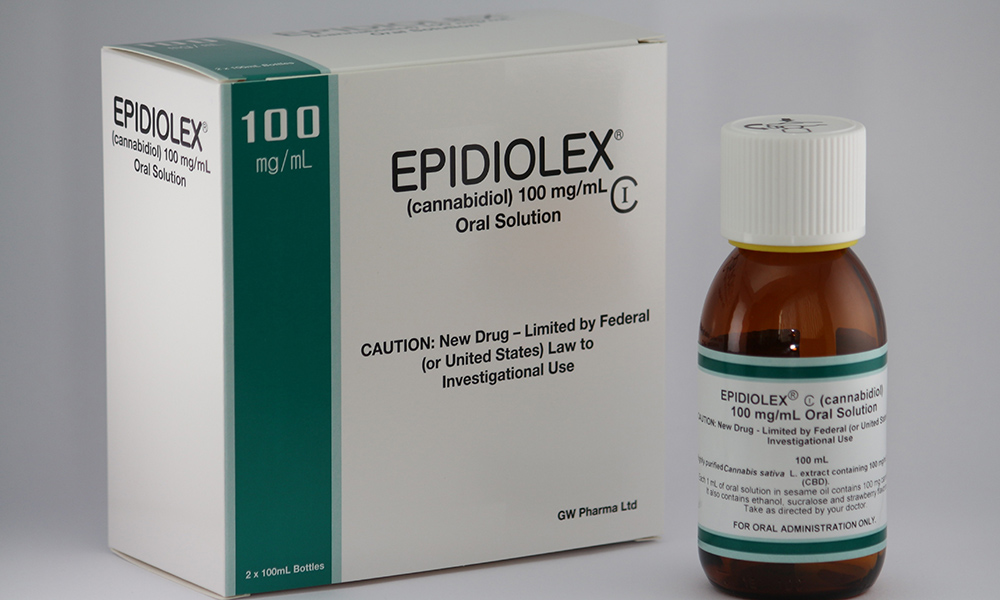 With the DEA's rescheduling of Epidiolex, shares in the British manufacturer of the drug are soaring. But CBD—the actual cannabinoid that the product is based on—is to remain in the restrictive Scheudle 1.
With the DEA's rescheduling of Epidiolex, shares in the British manufacturer of the drug are soaring. But CBD—the actual cannabinoid that the product is based on—is to remain in the restrictive Scheudle 1.
On Sept. 27, the Drug Enforcement Administration officially withdrew the CBD-based drug Epidiolex from Schedule 1and placed it in Schedule 5. The change was recorded in the Federal Register, amd also announced in a press release by the drug's manufacturer. Industry and advocates had been anticipating a DEA's decision status of cannabidiol (CBD) under terms of the 1970 Controlled Substances Act. But ithe cannabinoid itself is not to be rescheduled—only the pharmaceutical product derived from it.
This dilemma began with the Food & Drug Administration's June approval of the CBD preparation Epidiolex—despite the fact that the DEA considers its active component a Schedule 1 substance, with no medical applications. With the two agencies now in direct policy conflict with each other, the DEA was obliged to reconsider the status of CBD—or at least Epidiolex. The product's manufacturer announced that it expected the DEA to issue a decision within 90 days. That deadline is now imminent.
That manufacturer is British firm GW Pharmaceuticals, whose operations have made the United Kingdom the world's biggest producer of legal cannabis. It is also one of the first businesses dealing in legal cannabis to be listed on NASDAQ.
Website Investor Place reported Sept. 19 that GW's shares are on the rise, with trading volume also soaring by more than four times the company's daily average, following a report from Morgan Stanley analyst David Lebowitz stating that the DEA is planning to reschedule Epidiolex.
According to the report, summarized on Benzinga website, the DEA would drop Epidiolex from Schedule 1—the same classification as heroin, LSD and MDMA (Ecstasy). This is the most restrictive of the classifications established by the Controlled Substances Act, for drugs with "high potential for abuse" and no legitimate medical application. (Contrary to erroneous coverage, cocaine is actually in the less restrictive Schedule 2, for drugs deemed to have "high potential for abuse" but some legitimate medical application.) The report asserted that Epidiolex is to be placed in Schedule 4, along with Xanax, Ambien and Tramadol, or Schedule 3, alongside codeine and anabolic steroids.
In fact, it was placed in the less restrictive Schedule 5, along with cough medicines containing small amounts of codeine, such as Robitussin .
Precautionary principle or corporate control?
Following FDA's June 25 approval of Epidiolex, The Verge quoted Stephanie Yip, an analyst at Informa Pharma Intelligence, on the assumption that the DEA would act within 90 days. But he expressed caution about what this would mean: "Cannabis contains so many different compounds and strains. The FDA has just approved this singular product through stringent testing and doses and specific concentrations. It’s gone through rigorous clinical reviews and FDA review, but the FDA is likely to still crack down on claims made with other products."
GW Pharmaceuticals offered its own statement at the time of the FDA decision. "Today’s approval of Epidiolex is a historic milestone, offering patients and their families the first and only FDA-approved CBD medicine to treat two severe, childhood-onset epilepsies," said GW CEO Justin Gover. "This approval is the culmination of GW's many years of partnership with patients, their families, and physicians in the epilepsy community to develop a much needed, novel medicine. These patients deserve and will soon have access to a cannabinoid medicine that has been thoroughly studied in clinical trials, manufactured to assure quality and consistency, and available by prescription under a physician's care."
FDA commissioner Scott Gottlieb cautioned in his press release on the Epidiolex decision: "it's...important to note that this is not an approval of marijuana or all of its components. This is the approval of one specific CBD medication for a specific use. And it was based on well-controlled clinical trials evaluating the use of this compound in the treatment of a specific condition. Moreover, this is a purified form of CBD. It's being delivered to patients in a reliable dosage form and through a reproducible route of delivery to ensure that patients derive the anticipated benefits. This is how sound medical science is advanced."
So there is some basis in the FDA's logic for the DEA to issue a narrow decision on Epidiolex but not CBD. However, this could point to a slow piecemeal approach to approval of cannabis-derived products—assuring that corporate control and a profit-driven system are maintained. This is obviously and dramatically at odds with the ethics of self-sufficiency and self-medication that were at the root of the medical marijuana movement a generation ago.
Cross-post to Cannabis Now
Photo via Cannabis Now







Recent comments
4 weeks 1 day ago
4 weeks 1 day ago
7 weeks 2 days ago
8 weeks 1 day ago
12 weeks 2 days ago
16 weeks 13 hours ago
20 weeks 18 hours ago
20 weeks 6 days ago
30 weeks 6 days ago
34 weeks 6 days ago